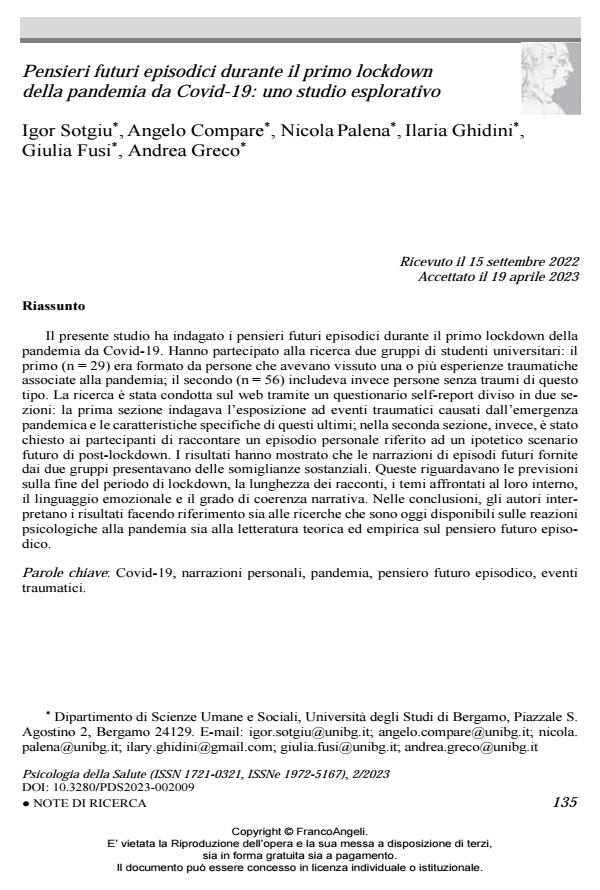Episodic future thoughts during the first Covid-19 pandemic lockdown
Journal title PSICOLOGIA DELLA SALUTE
Author/s Igor Sotgiu, Angelo Compare, Nicola Palena, Ilaria Ghidini, Giulia Fusi, Andrea Greco
Publishing Year 2023 Issue 2023/2
Language Italian Pages 17 P. 135-151 File size 251 KB
DOI 10.3280/PDS2023-002009
DOI is like a bar code for intellectual property: to have more infomation
click here
Below, you can see the article first page
If you want to buy this article in PDF format, you can do it, following the instructions to buy download credits

FrancoAngeli is member of Publishers International Linking Association, Inc (PILA), a not-for-profit association which run the CrossRef service enabling links to and from online scholarly content.
The present study investigated episodic future thoughts during the first lockdown of the Covid-19 pandemic. Two groups of university students took part in the study: the first group (n = 29) consisted of individuals who had experienced one or more traumatic experiences as-sociated with the pandemic; the second group (n = 56) included individuals without any such trauma. The study was conducted via an online self-report questionnaire encompassing two sections: the first section investigated exposure to and characteristics of traumatic events caused by the pandemic emergency; on the other hand, in the second section, participants were asked to recount a personal episode relating to a future post-lockdown scenario. The results showed that the narratives of future episodes provided by the two groups had substantial simi-larities. These included predictions about the end of the lockdown period, narrative length, core themes, emotional language, and the level of narrative coherence. In the conclusions, the authors interpret their results by referring to both research that is now available on psychologi-cal reactions to the pandemic and the theoretical and empirical literature on episodic future thinking.
Keywords: Covid-19, personal narratives, pandemic, episodic future thinking, traumatic events.
Igor Sotgiu, Angelo Compare, Nicola Palena, Ilaria Ghidini, Giulia Fusi, Andrea Greco, Pensieri futuri episodici durante il primo lockdown della pandemia da Covid-19: uno studio esplorativo in "PSICOLOGIA DELLA SALUTE" 2/2023, pp 135-151, DOI: 10.3280/PDS2023-002009